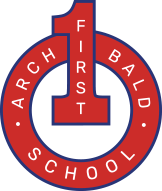Curriculum Information
What is the curriculum framework for each year group?
In addition to the statutory framework, at Archibald we follow the guidance of Development Matters. Please click on the link below to find out more about Development Matters.
From here, the children in Key Stage 1 and 2 progress to following the Primary Curriculum National Curriculum Document.
Below are our curriculum maps for Key Stage 1 and Key Stage 2 detailing the objectives covered in each of these phases.
Archibald First School Key Stage 1 Curriculum Objectives
Archibald First School Key Stage 2 Curriculum Objectives (elements in yellow will be covered in GJA)
Curriculum Documents
Each half term we share a curriculum booklet for every year group to let you know what the children will be learning about. They provide more information about how the learning above will be covered. You will find web links on the front page that can be accessed from home and information about visits/visitors too!
If you would like more information please speak to the class teachers.
These booklets will be shared on the year group pages.Assessment at Archibald
Early Years
When your child starts in Nursery or Reception at Archibald, we complete our own baseline to understand your child’s unique starting points. We then use these starting points to build on and develop their learning journey.
In Nursery, the baseline assessment includes activities such as counting out toys, drawing a picture of themselves, mark making and observations within play to see how children turn take and respond to one another.
In Reception, our school baseline assessment is very similar to the Nursery baseline with an added assessment of letter sounds and number recognition.
Reception aged children also complete the government Reception baseline assessment. More information for parents on the government assessment can be found by following the link below.
At the end of Reception, the children are assessed against 17 Early learning Goals within the Early Years Profile.
Year 1 and Key Stage 1 Phonics
All of our children in year 1 will take part in the phonics screening check in June. The purpose of the phonics screening check is to show that all children have learned and developed their phonic decoding to an age appropriate standard. It also helps us to identify if your child may need any additional support for their remaining time in year 1 and from there on.
Children who are still developing their phonic decoding skills at the end of year one, take part in the phonics screening check the following year at the end of year 2 (end of Key stage 1).
Year 4 Multiplication Check
Children in Year 4 participate in the multiplication tables check (MTC) in June each year. The purpose of the check is to celebrate how fluently your child can recall their times tables up to 12. It also helps us to identify if your child may need any additional support.
More information about the Year 4 Multiplication Check can be accessed below.



